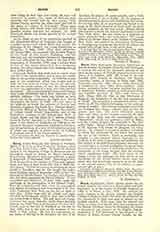

Bacon, JOHN (JOHANNES ANGLICUS, JOHANNES DE BACONTHORPE), an English Carmelite and theologian, b. towards the end of the thirteenth century at the place in the county of Norfolk whence he derives his name; d. in London, 1346. He is not to be confounded with Francis de Bachone, the Spanish Carmelite, reader of divinity in Paris from 1362, Procurator General, 1366, doctor, 1369, Provincial of Catalonia (d. circa 1390), doctor sublimis. John. Bacon, surnamed doctor resolutus, entered the order at Snitterley, Norfolk, studied at Oxford and Paris, was bachelor previous to 1321, and master in 1325. From 1329 till 1333 he was Provincial of England; the remainder of his life was consecrated to study. He possessed a penetrating mind, and wrote on all the subjects belonging to the ordinary course of studies. His writings comprised more than one hundred and twenty volumes, but are for the greater part lost. The most celebrated among them were those on the Gospels, especially St. Matthew, on St. Paul, and the commentary on the “Sentences”, which was printed in 1510 at Milan, and for a time became the textbook in the Carmelite Order. Bacon follows Averroes in preference to St. Thomas with whom he disagrees on many points. He adopted a system of Realism according to which the universals do not follow but precede the act of the intellect. Truth is materially and causally in the external object, formally in the intellect; in the order of generation and perfection the first subject is the individual substance; although the external object is in itself intelligible, the active intellect is required to render it ultimately intelligible; the conformity of the thing thought with the external object constitutes truth. The final cause of all things is God; but although the first object of our knowledge be the Divine essence Bacon does not admit that this knowledge comes to us by the light of our natural reason; it is, in his opinion, a super-natural gift of grace.
B. ZIMMERMAN

